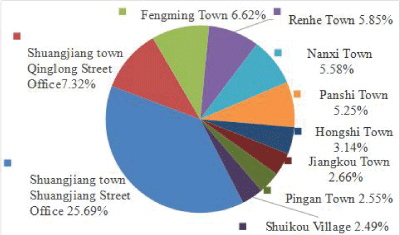
Figure 1: Area distribution of HFMD cases, Yunyang County, 2012 to 2016.


Lai Minqing1,2,3 Zhong Xiaoni1,2,3* Huang Xueqing4 Liu Jiaxiu1,2,3
1School of public health and management, Chongqing Medical University, China*Corresponding author: Zhong Xiaoni, Professor, Supervisor, Department of Epidemiology and Health Statistics, School of Public Health and Management, Chongqing Medical University, China, Tel: 13308368059; E-mail: :1932352920@qq.com
Objective: This study aimed to investigate the epidemiological characteristics of hand-foot-and-mouth disease (HFMD) in Yunyang County so as to provide a scientific basis for the prevention and control of HFMD.
Methods: HFMD data reported in Yunyang County between 2012 and 2016 were collected, and the epidemic characteristics were analyzed by descriptive epidemiology. All statistical analyses were performed with SAS9.2 software.
Results: A total of 6270 cases of HFMD were reported in Yunyang County from 2012 to 2016 with the annual average incidence of 135.26 per 100,000, including 17 severe cases and 3 death cases, 3697 males, and 2573 females. 5911 were clinically confirmed and 359 were confirmed by laboratory tests. A high incidence appeared every two years with peaks from April to June and from September to December. The top three districts with the highest cases were Shuangjiang Street, Qinglong Street, and Fengming Town. The distribution of the population mainly occurred in children ≤ 5 years old. In the case of occupation distribution, scattered children and preschool children dominated, accounting for 80.69% and 15.34% of the total respectively. 359 cases were EV positive, including human Enterovirus 71(EV71) (33.98%), Coxsackie virus type A16 (23.96%), and non-EV71 and non-Cox A16 Enterovirus (other EV) (42.06%).
Conclusions: Yunyang County has a high incidence from 2012 to 2016 with obvious seasonal, regional and population distribution. The main pathogens were Enteroviruses, among which Enterovirus 71 (EV71) was the most harmful one. Therefore, we need to strengthen the monitoring of HFMD in the high-risk seasons and population so as to reduce the outbreak and prevalence of HFMD.
HFMD; Epidemiology characteristics
Hand foot and mouth disease (HFMD) is a kind of infectious disease that occurs mostly in children under 5 years old. Many kinds of Enterovirus can cause the disease, the Coxsackievirus A16 (Cox A16) and Enterovirus type 71 (EV71) is most common. The common patients showed pain, anorexia, fever, herpes or ulcers in the hands, feet, and mouth, and the prognosis is good in one week. A few severe patients (especially children under 3 years old) are developing rapidly with complications such as pulmonary edema, myocarditis, and aseptic meningitis. A small number of patients are in critical condition, which may result in death [1]. On May 2, 2008, the state formally incorporated HFMD into the management of the report of the legal class C infectious diseases. In recent years, the incidence of HFMD has been increasing in some areas of China, and even outbreaks and epidemics. It poses a serious threat to the health of people, especially to the health of infants. To understand the incidence and epidemic trend of HFMD in Yunyang County of Chongqing, and to provide references for developing effective prevention and control measures, the epidemic characteristics of HFMD in Yunyang County of Chongqing in 2012-2016 years were analyzed.
The epidemic data and demographic data of hand foot mouth disease (HFMD) are derived from the Infectious Disease Reporting Information Management System and Basic Information System in China Disease Control and Prevention Information System. The reported cases are based on the date of onset and the address of residence.
The diagnosis is based on the Guideline for the Diagnosis and Treatment of Hand Foot and Mouth Disease (2010 Edition). The report is carried out according to the reporting management method of public health emergencies and infectious disease surveillance information.
Blood, swabs, herpes, stool specimens or anal swabs were collected in common cases, and cerebrospinal fluid specimens were needed in severe cases. The specimens were detected by the Yunyang County CDC laboratory, and the real-time fluorescence quantitative reverse transcription polymerase chain reaction (RT-PCR) was used to pick up the virus nucleic acid.
The information of the report card in the China Information System for Disease Control and Prevention is checked, and the case information is required to be complete, accurate and logical.
Data statistics and collection: The case information was derived from the China Information System for Disease Control and Prevention, and SAS9.2 was used for statistical analysis.
From 2012 to 31 December 2016, a total of 6270 HFMD cases were reported in Yunyang County of Chongqing, including 17 cases of severe cases and 3 cases of death. The average annual incidence rate of HFMD was 135.262 per 100,000 (range: 102.33 to 176 per 100,000), and the proportion of severe cases is 0.27%, with a mortality rate of HFMD was 0.07 per 100,000 and a fatality rate of HFMD 47.8 per 100,000.The incidence rate of HFMD reports fluctuated between 102.33 per 100,000 and 176.00 per 100,000 in the past 2012-2016 years, and the overall incidence of HFMD was rising. 2012, 2014, and 2016 were 3 progressive peak years, and the incidence of different years was different (Table 1).
| Year | Cases | Deaths | Severe case | Incidence rate /105 | Mortality/105 | Severe proportion%) |
| 2012 | 1162 | 0 | 1 | 125.85 | 0 | 0.09 |
| 2013 | 954 | 0 | 2 | 102.33 | 0 | 0.21 |
| 2014 | 1523 | 1 | 3 | 161.36 | 0.11 | 0.2 |
| 2015 | 1053 | 0 | 6 | 110.77 | 0 | 0.57 |
| 2016 | 1578 | 2 | 5 | 176 | 0.22 | 0.32 |
| Total | 6270 | 3 | 17 | 135.26 | 0.07 | 0.27 |
Table 1: The incidence and death of hand foot and mouth disease in Yunyang County in 2012-2016 years.
Case reports were reported in 2 streets and 40 towns in Yunyang County in 2012-2016 years. A total of 6204 cases were reported (66 cases of unknown villages and towns). The number of cases reported in the top ten towns was shown in figure 1.

Figure 1: Area distribution of HFMD cases, Yunyang County, 2012 to 2016.
The incidence of HFMD in Yunyang county was on the rise in 2012-2016, was lower than the national level before 2016, but finally reached the national level in 2016 (Figure 2). There are cases reported every month of the year. The incidence is obvious seasonality. It began to rise from March, and the first peak appeared in 4 ~ 6 months, then decreased, and it began to rise again in September, reaching the second peak in 10 ~ 12 months, but the number of cases was higher than the first peak (Figure 3). In the year of 2012-2016, among the reported HFMD cases of the 0-15 years old children, the number of annual incidence for male children were more than female children (Figure 4).
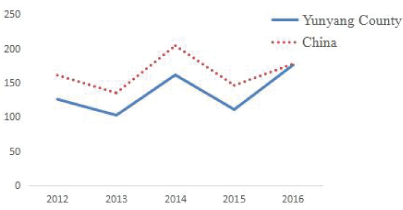
Figure 2: Time distribution of the incidence of HFMD cases, Yunyang County and China, 2012 to 2016.
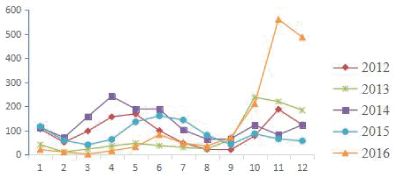
Figure 3: Time distribution of HFMD cases, Yunyang County, 2012 to 2016.
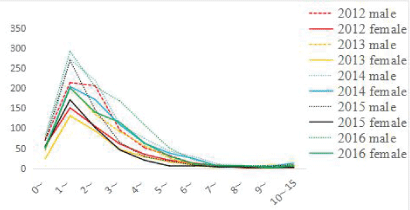
Figure 4: The time distribution of children of HMFD cases under 15 years old in different sex, Yunyang County, 2012 to 2016.
Sex distribution: In 6270 cases reports of 2012-2016 years, there were 3697 men and 2573 women, and the ratio of men and women was 1.44 to 1. The male incidence was higher than that of women every year (Table 2).
| Male | Female | |||
| Year | Cases | Incidence rate/105 | Cases | Incidence rate/105 |
| 2012 | 706 | 152.91 | 456 | 98.71 |
| 2013 | 582 | 124.89 | 372 | 79.78 |
| 2014 | 830 | 175.99 | 693 | 146.76 |
| 2015 | 634 | 131.14 | 419 | 89.69 |
| 2016 | 945 | 210.74 | 633 | 141.24 |
| Total | 3697 | 159.134 | 2573 | 111.236 |
Table 2: The incidence of hand foot and mouth disease reported in Yunyang county in 2012-2016 (1 per 100,000).
Age distribution: In the 2012-2016 years, the age of the HFMD cases is within 0 years of age., the maximum is over 70 years old, and the age of onset was mainly 1 ~ 3 years old group. The age of onset is mainly in the 1-3 years old group, accounting for 72.44% of the total cases, of which 1 year old group has the most reported cases, accounting for 33.62% (Table 3).
| Age | Cases | Total | Proportion(%) | |
| Male | Female | |||
| 0~ | 316 | 234 | 550 | 8.78 |
| 1~ | 1250 | 858 | 2108 | 33.62 |
| 2~ | 912 | 613 | 1525 | 24.32 |
| 3~ | 531 | 378 | 909 | 14.5 |
| 4~ | 318 | 209 | 527 | 8.41 |
| 5~ | 169 | 110 | 279 | 4.45 |
| 6~ | 75 | 65 | 140 | 2.23 |
| 7~ | 30 | 24 | 54 | 0.86 |
| 8~ | 24 | 20 | 44 | 0.7 |
| 9~ | 22 | 12 | 34 | 0.54 |
| 10~15 | 37 | 33 | 70 | 1.12 |
| ≥15 | 13 | 17 | 30 | 0.48 |
| Total | 3697 | 2573 | 6270 | 100 |
Table 3: The age distribution of the cases of hand foot and mouth disease reported in Yunyang County in 2012-2016 years.
Occupational distribution: In the report of 6270 cases, the number of scattered children was the most, reaching 5059 cases, accounting for 80.69% of the total report followed by the kindergarten’s children, 962 cases, accounting for 15.34% of the total report and there were 230 cases of students, 5 cases of farmers, 4 cases of housework and waiting for business, 4 cases of unknown occupation, 3 cases of teachers, 2 cadres and 1 other professions (Figure 5).
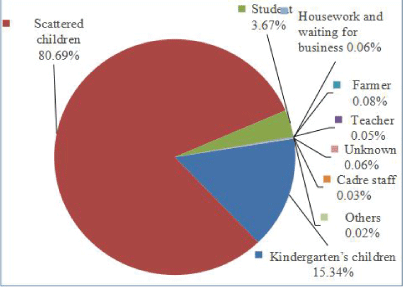
Figure 5: The Occupational distribution of HFMD cases, Yunyang County, 2012 to 2016.
In the 2012-2016 years, there were 359 laboratory-diagnosed cases of HFMD in Yunyang, accounting for 5.73% of the total reports, of which 349 cases of non-severe cases were laboratory diagnosis and 10 cases of severe cases were laboratory diagnosed. Among 359 laboratory diagnostic cases, Enterovirus EV71 (86 cases) accounted for 23.96%, Cox A16 (122 cases) accounted for 33.98%, and other Enterovirus (151 cases) accounted for 42.06%. Of the 349 cases of nonsevere cases, Enterovirus EV71 (78 cases) accounted for 22.35%, Cox A16 (121 cases) accounted for 34.67%, and other enterovirus (150 cases) accounted for 42.98%. Among the 10 cases of severe cases, Enterovirus EV71 (8 cases) accounted for 80%, Cox A16 (1 cases) accounted for 10%, and other Enterovirus (1 cases) accounted for 10%. The pathogenic spectrum of the 2012-2016 years was different. In 2012, Cox A16 and other Enterovirus were the main sources. In 2013, EV71 and other Enterovirus were the main sources. Cox A16 was the main form in 2014, and other Enteroviruses were the main ones in 2015. The distribution of EV71, Cox A16 and other enterovirus in 2016 was more balanced (Table 4).
| Year | Positive number | EV71 | Cox A16 | Other Enteroviruses |
| 2012 | 43 (12.00) | 8 (9.30) | 17 (13.93) | 18 (11.92) |
| 2013 | 55 (15.32) | 25 (29.07) | 2 (1.64) | 28 (18.54) |
| 2014 | 119 (33.15) | 20 (23.26) | 63 (51.64) | 36 (23.84) |
| 2015 | 56 (15.60) | 11 (12.79) | 8 (6.56) | 37 (24.50) |
| 2016 | 86 (24.00) | 22 (25.58) | 32 (26.23) | 32 (21.19) |
| Total | 359 (100.00) | 86 (100.00) | 122 (100.00) | 151 (100.00) |
Table 4: The detection of hand foot and mouth disease (HFMD) in Yunyang County in 2012-2016 years (case %)
Between 2012-2016 Yunyang County reported 17 cases of severe cases, accounted for 0.27%, and 3 cases died. The mortality rate was 0.07 per 100,000, and the fatality rate was 47.8 per 100,000. The reported 17 cases of severe cases were scattered children, including 10 males and 7 females. The sex ratio of men and women was 1.43:1. Of the 17 severe cases, 10 were detected in the laboratory, of which 8 were EV71 positive, 1 was positive for the CoxA16 virus, and other for Enterovirus positive.
In recent years, hand, foot, and mouth disease have been widely reported in most parts of the world, especially in the Asia Pacific region [1,2]. In the past 2012-2016 years, 6270 cases have been reported in Yunyang country. The incidence of hand foot mouth disease is increasing and the annual incidence is 135.262 per 100,000, which is higher than that in other cities [3] and other areas of Chongqing [4,5]. Among them, the incidence of 2012, 2014 and 2016 was higher, reached 125.85 per 100,000, 161.36 per 100,000 and 176.00 per 100,000, respectively. The decline in 2013 and 2015 may be related to the existence of a large outbreak or epidemic of the onset of hand foot and foot disease every 1-2 years. Further, when the country entered the legal category of infectious diseases with hand foot and mouth disease in 2008, it was emphasized by the CDC, and the training of medical institutions and medical personnel increased, which improved the sensitivity of the detection system [6].
The incidence of HFMD mainly concentrated in Shuangjiang Street, Qinglong Street, Fengming Town. These areas are mostly rural-urban fringe zone, with large population density, more floating population and poor sanitary conditions, which can easily lead to high incidence of hand foot and mouth disease [7].
The incidence of HFMD in Yunyang country has two peaks, concentrating on 4-6 and 10-12 months, suggesting that the distribution characteristics of the cases are related to seasons, and is consistent with those in Guizhou and Hubei provinces [8,9]. At the same time, the time distribution of cases is closer to the term beginning time of the kindergarten. Enteroviruses are widely found in nature, human beings are the only hosts. Either patients or healthy carriers are the sources of infection. They can be transmitted through the digestive tract (fecal-oral route), respiratory tract (respiratory secretions, saliva) and close contact (contaminated hands or articles, herpes fluid). In Yunyang County, the summer weather is hot, the air is moist, and the temperature in autumn is still high. At the same time, the peak incidence of HFMD and nurseries in the school time to provide the conditions for the spread of the disease.
Yunyang County reported the incidence of hand foot and mouth disease in children under the age of 5 and mainly focused on 1 ~ 3 years old children, accounting for 72.44%. Which may be related to blowing 6 months old in the infant maternal antibody level is higher, and 6 ~ 12 months old maternal antibody completely recession, 1-4 years for natural exposure and gradually produce autoantibodies, the antibody level of children over the age of 5 self-generated at a relatively high level of stability [10]. The male incidence in sex distribution is higher than that of women. The possible reason is that boys are involved in more outdoor activities and are more likely to be exposed to pathogens. The occupations were dominated by scattered children (80.69%) and young children (15.34%), which accounted for 96.03% of the total. This may be related to the ability of children, enhance free hygiene habits and children in the collective environment, easy to cause the spread of disease and the pathogenesis of accumulation [11]. Therefore, the scattered and young children of the age group of 5 and below should be regarded as the key population for the prevention and control of hand foot and mouth disease. Taking summer and autumn as the focus of prevention and control, we should train children to form good hygiene habits from childhood, and not bring children to public places where children are gathered. When they are sick, we should go to the hospital in time to prevent the occurrence of hand foot and mouth disease.
In the past 2012-2016 years, the composition of other non EV71 and non CoxA16 Enteroviruses showed an upward trend. The composition of EV71 and CoxA16 showed a decreasing trend in Yunyang, which is different from the other dominant strains reported in other report [12]. The Enterovirus in severe cases is mainly EV71, which indicates that EV71 is more harmful. This kind of Enterovirus should still be the focus of hand foot and mouth disease monitoring. At the same time, the increase in the number of other viruses may change the epidemic trend and should not be underestimated.
The incidence of hand foot and mouth disease in Yunyang is higher than that in other areas, and the overall trend is on the rise. Especially in 2016, the hand foot and mouth disease in the county has reached the national level. We should attach great importance to it and publicize related knowledge so as to raise public awareness of hand foot and mouth disease. It is suggested that scientific prevention and control strategies for children and scattered children, especially children under 5 years of age, are developed in summer and autumn. At the same time, we should strengthen training for kindergartens, schools, teachers, and parents to improve their discriminating ability for symptoms and signs of hand foot mouth disease and find the first case to take immediate measures to prevent the spread of the epidemic. The health department should combine the relevant departments of sanitation, municipal and other municipal departments to improve the health environment of the urban and rural area. The vaccine will become one of the effective measures to control HFMD, but currently listed on the EV71 vaccine has only a protective effect on hand foot mouth disease caused by EV71 infection, and cannot prevent other hand, foot and mouth disease caused by other enterovirus. Therefore, it is urgent to develop a combined vaccine including multiple enteroviruses, so as to control HFMD.
Download Provisional PDF Here
Article Type: RESEARCH ARTICLE
Citation: Minqing L, Xiaoni Z, Xueqing H, Jiaxiu L (2018) Epidemiological Characteristics of Hand, Foot, and Mouth Disease in Yunyang County of Chongqing, China, 2012-2016. J Epidemiol Public Health Rev 3(1): dx.doi.org/10.16966/2471-8211.161
Copyright: © 2018 Minqing L, et al. This is an open-access article distributed under the terms of the Creative Commons Attribution License, which permits unrestricted use, distribution, and reproduction in any medium, provided the original author and source are credited.
Publication history:
All Sci Forschen Journals are Open Access